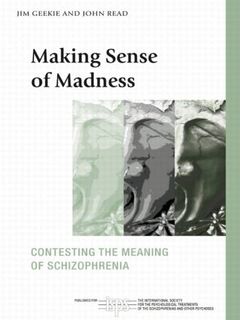Making Sense of Madness Contesting the Meaning of Schizophrenia The International Society for Psychological and Social Approaches to Psychosis Book Series
Auteurs : Geekie Jim, Read John

The experience of madness ? which might also be referred to more formally as ?schizophrenia? or ?psychosis? ? consists of a complex, confusing and often distressing collection of experiences, such as hearing voices or developing unusual, seemingly unfounded beliefs. Madness, in its various forms and guises, seems to be a ubiquitous feature of being human, yet our ability to make sense of madness, and our knowledge of how to help those who are so troubled, is limited.
Making Sense of Madness explores the subjective experiences of madness. Using clients' stories and verbatim descriptions, it argues that the experience of 'madness' is an integral part of what it is to be human, and that greater focus on subjective experiences can contribute to professional understandings and ways of helping those who might be troubled by these experiences.
Areas of discussion include:
- how people who experience psychosis make sense of it themselves
- scientific/professional understandings of ?madness'
- what the public thinks about ?schizophrenia?
Making Sense of Madness will be essential reading for all mental health professionals as well as being of great interest to people who experience psychosis and their families and friends.
Introduction. The Subjective Experience of Madness. Making Sense of Madness I: Subjective Experience. Making Sense of Madness II: Lay Understandings. What Does the Public Think About ‘Schizophrenia?’ Making Sense of Madness III: Scientific/Professional Understandings of ‘Madness.’ Bringing it all Together. What ‘Schizophrenia’ Really Is. Where to From Here?
Jim Geekie is a clinical psychologist who has been working for Auckland District Health Board in New Zealand since 1995, mostly in the area of early intervention for psychosis. Before moving to New Zealand, he worked in Scotland and England as a psychologist, and before that he spent a few years living in East Africa, where he was employed as a teacher of psychology and philosophy.
John Read is an Associate Professor in Clinical Psychology at the University of Auckland, New Zealand. Before that he worked for twenty years as a clinical psychologist and manager of mental health services – predominantly in services for people diagnosed psychotic in the USA and New Zealand. He is the coordinating editor of Models of Madness: Psychological, Social and Biological Approaches to Schizophrenia (Routledge, 2004) and editor of the journal 'Psychosis: Psychological, Social and Integrative Approaches'.
Date de parution : 05-2009
15.6x23.4 cm
Date de parution : 02-2016
15.6x23.4 cm
Thème de Making Sense of Madness :
Mots-clés :
Psychotic Experiences; psychotic; Clinical Practice; experiences; Essentially Contested; mental; Mental Health Services; health; American Psychiatric Association; services; Client’s Subjective Experience; hearing; Term Psychosis; voices; Chronic; subjective; USA; experience; Follow; essentially; Client’s Experience; Ect; West Germany; Tottenham Hotspurs Football Club; Client’s Understanding; Biogenetic Explanation; Neurodevelopmental Theories; Appraisive Concept; Negative Symptoms; Explanatory Models; Ethical Medical Practice; Nosological Process; Delusional Beliefs; Anti-psychotic Drugs; Hearing Voices



